WSU vs. USC takeaways
After a crushing defeat to USC on Dec. 6, there are five takeaways that sum up the current state for WSU football
JOHN MCGILLEN | COURTESY OF USC ATHLETICS
Redshirt senior Deon Mcintosh rushed for 65 yards against USC on Dec. 6, his lowest rushing total so far in the 2020 season.
December 9, 2020
I, like probably most WSU fans, wish I could forget about the Cougars’ 38-13 loss to USC. Unfortunately, I can’t do that. I have too good of a memory, and I have to write this article.
While most of Sunday’s game was hard to watch, that does not mean that nothing went well for the Cougars. There were some things, very minor things, that provide hope for the future of the program.
How does the saying go? Every cloud has a silver lining. Well, most of this cloud is dark and dreary but there is the smallest of silver linings.
Takeaway #1: We were right, the secondary is still heavily outmatched
Through the first two games of the season, the Cougar secondary looked promising at times. They held their own against Oregon State and a very explosive Oregon offense.
While by no means did they shut down any passing attacks, they also had not been completely dominated by an opposing quarterback. Until Sunday.
USC quarterback Kedon Slovis’s stat line of 12-13 for 133 yards and four touchdowns was not anything too crazy until you realize that was just in the first quarter.
He finished with 287 yards and five touchdowns but the most telling sign was the seven incompletions. Slovis was able to pick apart the defense in whatever way he wanted to.
USC’s receivers proved to be too much for the undermanned Cougar secondary, who was playing without four members, including starting cornerback Jaylen Watson.
The Trojan receivers might be the best group in the nation, but that is no excuse for the WSU secondary to play the way they did. If this team and this defense want to improve in the future, the secondary needs to take a huge step up.
Takeaway #2: Deon McIntosh quietly had his most impressive game
By now everybody knows that McIntosh is a top running back in the conference. Although his 10 carries for 65 yards was his worst rushing performance of the year, he still managed to impress.
The breakout running back’s low yardage total was not his fault by any means. He averaged 6.5 yards per carry, which is just under his previous season average of seven. McIntosh looked good when he did carry the ball, gaining big chunks of yards and punishing the USC defense with his hard running style.
It is what he did without the ball that is the biggest indicator of McIntosh’s ability and skill.
A new wrinkle in head coach Nick Rolovich’s offense is that the running backs have to help out in pass protection. This what not something the backs had to do last season but the coaches have been impressed by the way the group has learned and developed the new skill.
McIntosh was called on frequently to help out in pass blocking, specifically picking up blitzers and free rushers. It is not a skill that people take notice of, it certainly doesn’t garner as much attention as a rusher for over 100 yards, but it has been impressive nonetheless.
Takeaway #3: Jayden de Laura is a freshman
The dream of seeing de Laura go into the Coliseum and take down the mighty Trojans was not able to come to fruition.
For the first time this season, de Laura’s youth and inexperience was on display. He had a rough outing, throwing for 134 yards on a 62 percent completion percentage.
The worst of it came toward the end of the first quarter when the freshman threw an interception on consecutive offense plays. He had gone without throwing a pick for seven straight quarters before those two costly mistakes.
The Cougars also lost a fumble on a botched exchange between de Laura and McIntosh, bringing the quarterback’s turnover count for the game to three.
Every signal caller has a bad game at some point, it’s just the nature of the position. It sucks that de Laura’s dud came in such a big game in an already shortened season where each contest matters even more.
The odds we see another performance like this from de Laura are very low. He has already demonstrated his ability to play well at this level and his demeanor and the way he handled the adversity points to him being able to bounce back in due time.
At the end of the day, he’s a freshman and he still has a lot of learning and maturing left to do. If this is the worst game of de Laura’s Cougar career then fans are in for a treat over the next three to four years.
Takeaway #4: Jamire Calvin got the opportunity but didn’t deliver
Offensive coordinator Brian Smith made it clear that the offense was going to emphasize using Calvin more in the coming weeks. That much held true, but the results were not what people were hoping for.
The wide receiver caught a season-high four passes, but he gained only 17 yards on them. He registered a season-low 4.3 yards per reception, not great for the supposed third offensive weapon.
Now the blame does not go solely onto Calvin. The offense as a whole sputtered and was never able to get anything going. USC also has an incredibly talented and athletic secondary, the likes of which the Cougars probably will not face the rest of the season.
The good thing was that the targets were there for Calvin. He was thrown to much more than the four times he was able to catch the ball.
He was also one missed big play away from putting together a very impressive stat line. Calvin beat his defender off the line and was open down the field, de Laura underthrew the ball and Calvin was not able to come up with it; a perfect throw probably results in a long touchdown.
If the offense is able to get into rhythm in the next two games, Calvin will have more opportunities to shine if given the same amount of attention in the offense.
Takeaway #5: The run defense is good?
This is the hardest part of the game to comprehend from Sunday because there are so many possible expectations.
Did the Trojans dominate through the air so much that they did not have to run the ball? Did USC try to run the clock out once they went up 35-0 in the second quarter? Is the WSU run defense actually good and just shut down their opponent’s ground game?
The final stat sheet says that the Cougars held USC to just five rushing yards for a per-carry average of 0.3 yards.
Those numbers are inflated by the way college football includes sack yardage in rushing totals, but even if you remove Slovis’s -20 rushing yards the Trojans still only managed 25 yards for a little over 1.5 yards a carry.
This was the best the run defense has looked in years and the third game in a row where the unit looked improved in that area of the game.
Defensive coordinator Jake Dickert was adept at stopping the run last season at Wyoming, so hopes were high that he could do the same thing for the Cougars.
The early returns are that this unit has proven the ability to hold their own against the ground game. Even when they gave up bigger rushing performances to the likes of Jermar Jefferson and CJ Verdell, they were not the same type of dominant ground games as years past.
The game against USC was atrocious, but if there is one positive to come from it, it is that the Cougar defense can stop the run.
Editor’s note: this story has been updated to include the final score in the game.

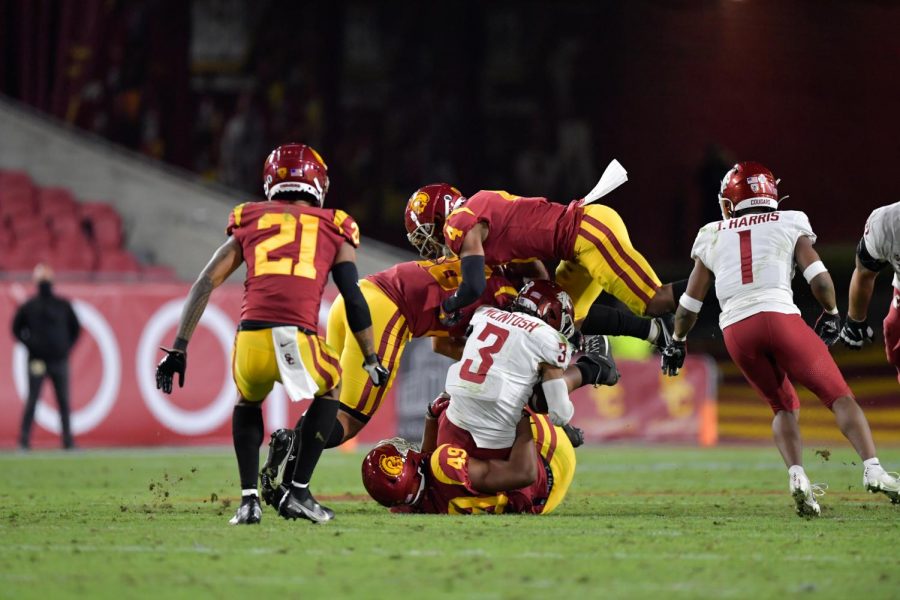




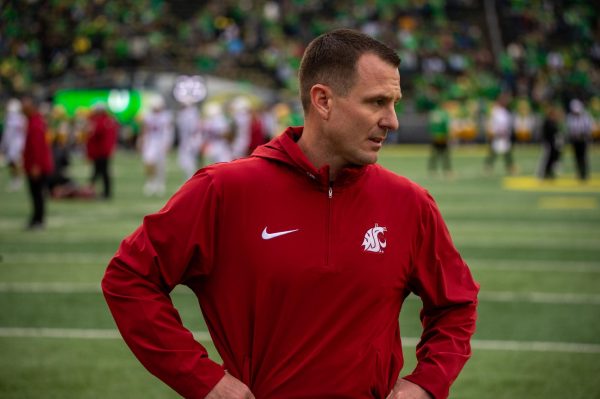
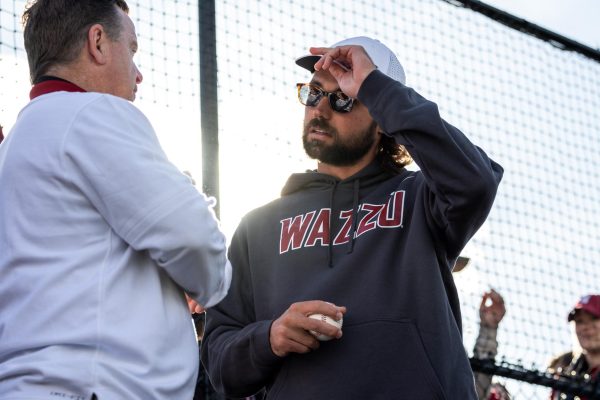
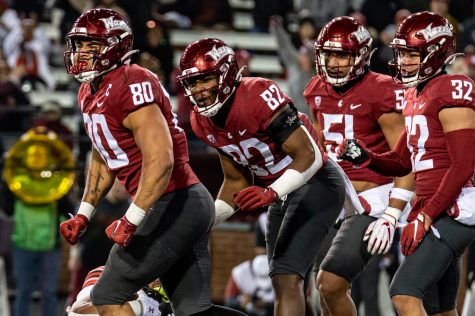
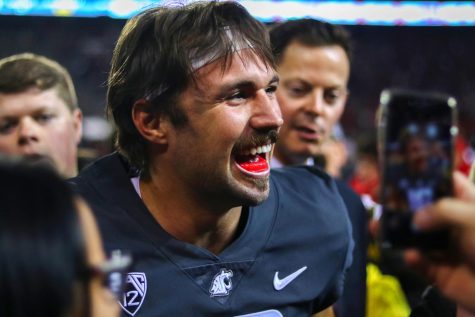
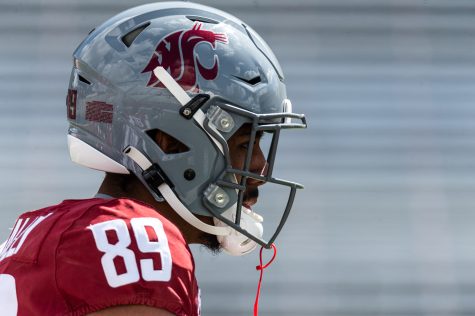
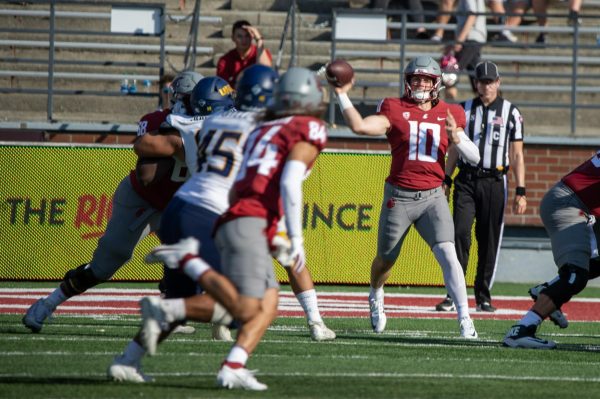
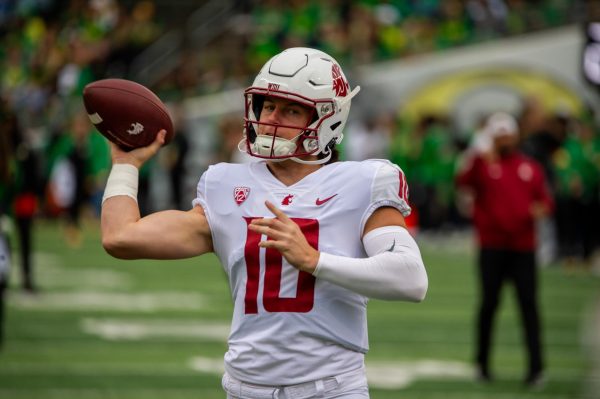
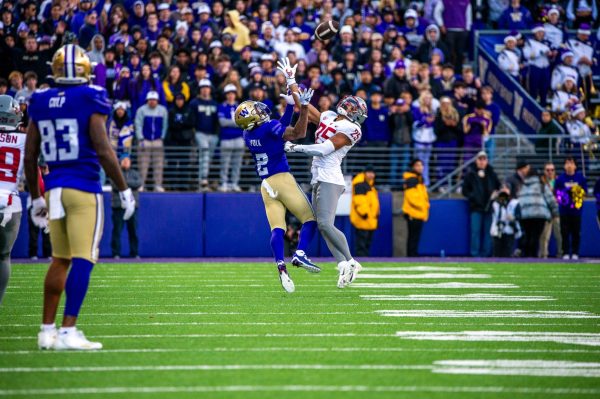




Brooks Burford • Dec 9, 2020 at 11:03 am
Cody: I have read this story once and reread this story twice and, for the life of me, nowhere can I find you including the final score. THE FINAL SCORE. If this was such a “crushing defeat”… what was the final score?